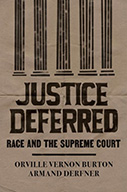Justice Deferred: Race and the Supreme Court

Author: Orville Vernon Burton & Armand Derfner
Publisher: Harvard University Press, 2021. 464 pages.
Reviewer: Jeffrey Adler | December 2022
Far more than a study of constitutional law, Justice Deferred is an engaging, accessible, and elegantly written analysis of the history of American race relations, framed around roughly two hundred Supreme Court cases. The authors, Burton, a Southern and legal historian, and Derfner, a civil rights attorney, blend their expertise to produce a compelling, nuanced study of an immensely important and timely topic. Although the book focuses on the impact of the law on African Americans, it examines cases affecting Asian and Native Americans as well. Burton and Derfner are quick to explain that the relationship between race and law in the United States is complex and non-linear; it is characterized by bursts of progress and retrenchment in the pursuit of the national ideal of creating a legal system, as well as a society shorn of racial discrimination and systemic bigotry.
“No institution is better suited than the Supreme Court,” Burton and Derfner argue, “to define the golden ideals of America,” but no institution may be better positioned to subvert and undermine protections for fairness (p. 11). Eras of increasing Supreme Court commitment to and rejection of racial justice have been uneven, with strong overall trends punctuated by outlying decisions and jurisprudential inconsistency. Myriad pressures and forces contribute to the halting patterns; shifting political currents, changes in the composition of the Court, and the evolving legal philosophies of individual justices shape the power and influence of the highest court in the land. Such factors notwithstanding, Burton and Derfner identify clear, wider trends in the relationship between race and law in the United States. During some eras, the Court embraced the broader, more expansive potential of the law to protect people of color from violence and discrimination. But in other periods, the Court adopted narrower readings of civil rights protections and permitted states to abandon safeguards against bigotry and racial injustice. With unusual cogence, Burton and Derfner analyze these conflicting currents.
Justice Deferred covers the full span of U.S. history, though the period since the Civil War commands particular examination, reflecting the Court’s greater attention to race and law. The Reconstruction-era constitutional Amendments transformed the legal system’s role in American society. Before the Civil War, the constitution mainly established the boundaries of federal authority. With the passage of the Thirteenth, Fourteenth, and Fifteenth Amendments, however, the national government became the guardian of liberty and the rights attached to citizenship. Court decisions shaped daily life for African Americans, in some eras bolstering legal protections and in other eras permitting egregious racial discrimination and repression. During the Reconstruction years, the Court provided a formidable bulwark against racial injustice, marshalling the power of the legal system to extend the rights of citizenship and due-process protections to African Americans. But the Court’s role pivoted sharply during the closing decades of the century. A torrent of cases treated the law and federal authority as the least they could mean for racial justice, eviscerating the capacious reach of the constitution in the service of fairness with regard to the treatment of African Americans. To the contrary, the Court gave free rein to states and white supremacists to discriminate and even commit horrific acts of racial oppression, clearing the way for “a hundred years of murder and mayhem” (p. 67). By the 1890s, Jim Crow had become the “law of the land,” a shift spearheaded by the Supreme Court (p. 97).
The legal pendulum swung in the opposite direction during the mid-twentieth century, culminating in the Warren Court’s fierce commitment to employing the power of the government to guarantee due process. The Court’s embrace of racial justice, however, proved to be short lived. By the 1970s the winds of Supreme Court decisions shifted again, and the Court largely retreated from and even abandoned any commitment to maintaining safeguards against racial discrimination, as demagogues invoked fears of Black Power and threats to law and order to undermine legal protections for African Americans. Recent Court support for thinly veiled disfranchisement legislation leaves the ideal of a nation unfettered by racial discrimination deferred once more.
Although the book is already massive and encyclopedic, Burton and Derfner might have provided more evidence documenting the impact of the Supreme Court rulings they examine. Scholars from a wide range of disciplines have meticulously charted racial disparities in searches, arrests, incarcerations, sentences, plea arrangements, capital punishment, residential segregation, and disfranchisement, for example, resulting from the decisions discussed in Justice Deferred. Including such material would have made Burton and Derfner’s book even more powerful. But this is a minor shortcoming in a superb study.
Burton and Derfner recognize that public officials and law enforcers often ignore or evade legal and constitutional safeguards. In modern America, more than 90 percent of felony convictions come from plea bargains in which many suspects agree to deals without legal counsel and without invoking their constitutional rights. In addition, legislators often engineer workaround language to sidestep constitutional protections by enacting “neutrally worded laws to conceal racial discrimination” (p. 75). Too often, local criminal justice officials also simply operate without deferring to the rule of law. “Unwritten laws,” the authors lament, “can be more powerful than written codes” (p. 342). Thus, the disjuncture between law and practice may be even more pronounced than Justice Deferred implies. In the present political climate, the American ideal of racial equality before the law seems especially elusive and chimerical.
Jeffery Adler is a Professor of History at The University of Florida.


